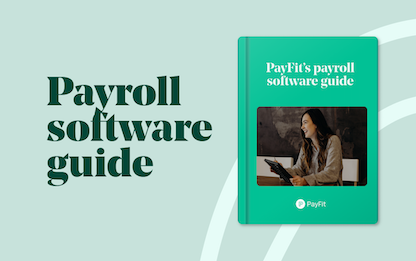- Blog
- |Managing Payroll
- >Payroll
- >guide to payroll services for small businesses
Payroll Services: A Guide for Small Business Owners


Just finding your feet as a company owner? Signing up to a payroll service for your small business at this early stage might feel a little OTT. After all, if you’ve only got a handful of employees to deal with…what could possibly go wrong?
Well, it turns out there’s a lot that could go pear-shaped or, at the very least, add to the pile of challenges you’ll face as a small business on a daily basis.
Payroll isn’t a walk in the park, even for small businesses. That’s why many small businesses eventually turn to payroll and HR services (like in-house software) that can support these more administrative functions. And while some of these solutions can be on the slightly pricey side, some are well worth the investment if it means saving you from paying HMRC a pretty penny in fines.
Finding an affordable payroll service for your small business will depend largely on your budget, requirements and where you see your company headed over the long run (scaling, we hope!). But it can be done.
Here’s an in-depth guide to shopping around for payroll services for your small business.
Do you need a payroll service as a small business?
If you can count the number of employees you’ve got on one hand, it’s tempting to keep things light touch - issue payments on a cash basis every week or make a quick lot of bank transfers at the end of each month without thinking too much about it.
But there’s one very big problem with this mentality, which can be summed up in four little letters…H, M, R and C.
That’s right. Falling foul of HMRC regulations is one of the most common pitfalls for new business owners. As if there aren’t enough other small business-y things to keep track of - such as staying afloat and keeping the lights on - you’ve also got to stay on top of payroll legislation (which is endlessly confusing and ever-changing).
And this can all come to a head, especially in the build-up to the end of the tax year when you’ve suddenly got loads of submissions to make and statutory rates to change.
Already breaking a sweat? Don’t despair completely, because there is help at hand. Payroll services for small businesses, including payroll software, can make all these payroll-centric tasks much nicer and simpler to deal with. Here’s how.
What are the benefits of using payroll services as a small business?
Luckily, there are a few payroll solutions out there designed specifically with small businesses in mind. And here’s a big list of reasons why you might want to sign up for one of these.
Automation and efficiency
Now, this depends on what kind of payroll service provider you opt for, but if you choose one that includes cloud-based payroll software, you’ll get to streamline all those repetitive and grating payroll tasks that can take forever to get through. Think payroll calculations, data entry, generating payslips and more.
Swifter payment options
Most payroll services for small businesses in the UK will offer some kind of a direct deposit option, making it easy-peasy to send payments online to employees. Even better, some payroll providers may also offer quicker payment options; PayFit, for example, integrates with Telleroo and Faster Payments for bulk payments.
Safer data handling
Employee data is extremely sensitive and can fall prey to hackers carrying out nasty cyber attacks. That makes data security your top priority as a business owner. Reputable accounting and payroll services for small businesses will invest continuously in maintaining and upgrading their security measures to meet stringent standards like ISO 27001.
Access to payroll expertise
Nerding out on payroll legislation not your cup of tea? That’s ok, we didn’t think so. And let’s face it: Small business owners shouldn’t have to spend hours combing through complex government literature just to understand how to run payroll at a basic level.
Most online payroll services for small businesses will have payroll specialists you can speak with to get those complex queries answered. Or you could opt for HMRC-recognised payroll software that takes care of all of that for you (now that’s clever).
Scalability
Finally, there’s the scalability aspect. As your small business grows, its payroll needs are sure to evolve. Payroll service providers, especially software-based ones, provide scalable solutions that can flex with your business requirements as your company grows.

How much do payroll services cost for small businesses?
The cost of payroll services geared toward small businesses can vary significantly, but here’s a high-level assessment of the market. While some cheaper software can cost as little as £10-£25 a month, a fully managed outsourced payroll service could cost as much as £25 per employee per month.
PayFit offers a Light plan, which starts from £6 per employee per month, which includes automation of RTI and pension submissions as well as bank files, payslip generation and video onboarding and training.
So, how exactly do you go about choosing the right payroll provider? Is there some sort of magic formula or strategy for, oh wait! Here it is…
How to choose the right payroll service provider for your small business
Understand your responsibilities as a small business
As we touched on briefly, operating a smaller business can lull you into a false sense of security that nothing terribly bad will happen, even if you muck up your payroll, even just a little bit. But this sense of security is very much that: false.
You might not be a large enterprise facing millions of pounds in fines (yes, that can happen). But still, an unexpected penalty or fine from HMRC could be enough to set you back, especially if you’re managing cashflow tightly.
Getting clear on what your responsibilities are as a business owner to keep your payroll compliant can help inform your search for a new provider, like:
Knowing that your RTI submissions can’t be late (the penalty starts at £100 for the first missed deadline if you have over nine employees)
Keeping on top of payroll records for HMRC (the penalty can be up to £3000 if you don’t)
Paying your employees minimum wage (get ready for it; you could be fined up to £20,000 if you don’t do this)
All of this should be front of mind when assessing the suitability of payroll services for your small business. You’ll want to know that, at a minimum, your chosen provider can support you in maintaining these business responsibilities, whether through the payroll expertise they offer or the quality of their payroll software.
Get clear on your requirements
Once you have a good idea of what you’re broadly accountable for as a business owner and what features or benefits you’ll need, at a minimum, from a provider, you can start to visualise your dream solution.
And when we say ‘dream’ solution, what we really mean is a payroll solution that works for your business and its unique needs.
You might get some recommendations from friends in the startup space, and these could be great. But you’ll still want to do a product walkthrough of each of these and assess them against your list of criteria to ensure they will, in fact, be suitable for your business.
Start by sitting down with your key stakeholders (e.g. the person(s) in your business who will be dealing with payroll) to draw up a wishlist of all the things you’ll want your new payroll provider to do. Make sure to get as many opinions as possible - even from your employees - to add to this list.
Weigh up the cost vs. value of different systems
There are lots (and lots) of different payroll solutions and services out there. So much so that it can get a little challenging getting to grips with the entire payroll-verse. What’s best for your business will depend on the criteria you’ve outlined above. But now, you’ve got to go one step further and weigh up the cost and value of different systems.
Some payroll solutions are very inexpensive (think cheaper software or accounting software where payroll is an add-on), other providers might be very expensive (like working with an accountant who specialises in payroll).
While opting for the cheapest payroll service for your small business is tempting, this might not be the best decision in the long run. Still, budget is an important consideration. You’ll need to decide what you can afford based on the stage of your business and your plans for its growth.
Decide what makes sense for your business
As you compare payroll services for your small business, you’re sure to discover at least a couple of solutions you can shortlist.
It can feel like a big decision to make - after all, payroll is something you need to run every month - but if you’ve done your research and followed the advice in this piece, you’ll have all the information you need to make a great decision.
If you need more help deciding, here are a few other factors to consider when choosing a payroll provider.
What is the best payroll service for small businesses?
PayFit, of course, would be our answer! But bias aside, this is a difficult question for anyone else to answer.
Only you and the employees directly involved with running payroll at your business will understand what your company truly needs. Which is why it’s essential to work through the stages we’ve laid out above and conduct a proper search for the right provider.
Still, you’ll want to consider having some sort of solution in place in order to manage payroll effortlessly, even as a small business. Getting the right systems in place, even before you scale, could end up saving you a lot of time, money and extra shenanigans down the line.


The 2024 UK National Living Wage - An Employer’s Guide

The Cost Of Recruitment In The UK - What You Might Not Know

UK National Insurance Changes for January 2024

End Of Tax Year 2023/2024 - Eight Key Changes For 24/25

Strategies to Reduce Employee Turnover

